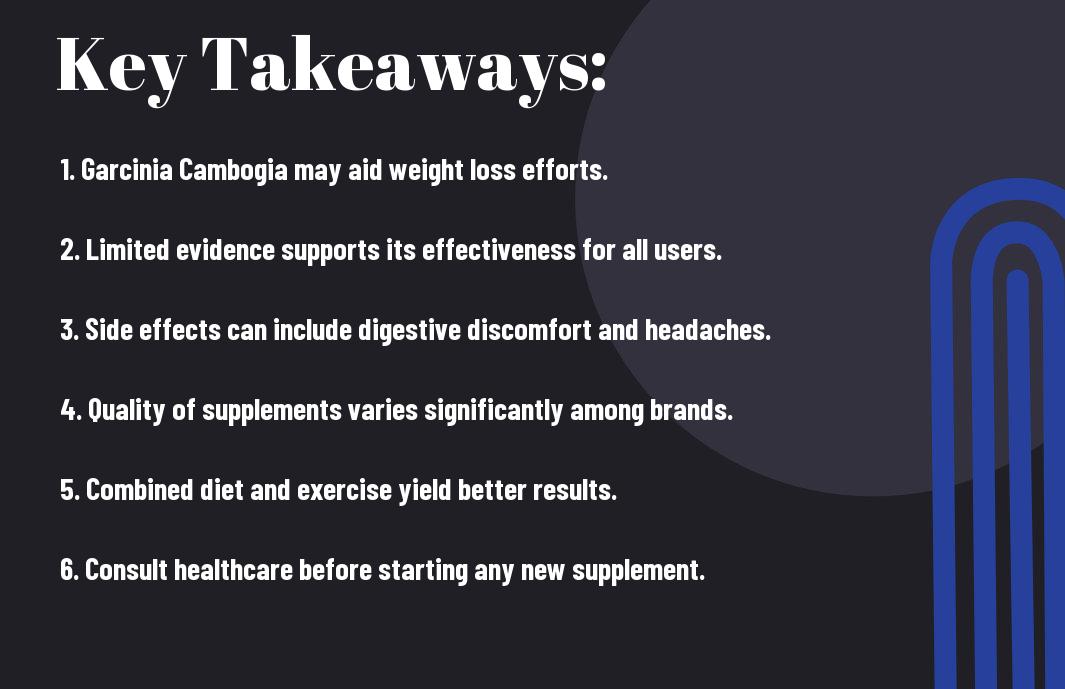Research has revealed important insights into Garcinia Cambogia, a tropical fruit often touted for its weight loss properties. As you explore the latest findings, you’ll uncover what the science truly indicates about its effectiveness, potential benefits, and any associated risks. This comprehensive review will equip you with the knowledge you need to make informed decisions regarding your health and wellness journey.
Key Takeaways:
- Weight Loss Efficacy: Recent studies indicate that Garcinia Cambogia may have minimal effects on weight loss compared to traditional methods such as diet and exercise.
- Active Compound: Hydroxycitric acid (HCA) is the primary active ingredient in Garcinia Cambogia, which is believed to impact fat metabolism and appetite suppression.
- Clinical Trials: Several clinical trials show mixed results; some individuals experience modest weight reduction while others report no significant changes.
- Side Effects: Common adverse effects can include gastrointestinal issues like nausea, diarrhea, and stomach discomfort.
- Long-term Safety: There is currently limited data on the long-term safety of Garcinia Cambogia, necessitating caution for prolonged use.
- Supplement Variability: The concentration of HCA in supplements can vary greatly, making it difficult to determine an effective dosage.
- Complementary Approach: Experts recommend using Garcinia Cambogia as a complement to a balanced diet and exercise rather than a standalone solution for weight loss.

Overview of Garcinia Cambogia
A popular tropical fruit, Garcinia Cambogia has gained significant attention for its potential health benefits, particularly in weight management. Native to Southeast Asia, this small pumpkin-shaped fruit is often highlighted for its active compound, hydroxycitric acid (HCA), which is believed to play a role in fat reduction and appetite suppression. As you explore the latest research and findings, you’ll understand how this fruit fits into the broader context of health and wellness.
What is Garcinia Cambogia?
Behind its intriguing name, Garcinia Cambogia is a tropical plant whose fruit contains HCA, a substance studied for its weight loss effects. This fruit has become popular in dietary supplements, and you may find it marketed as a natural aid to help with weight control and overall health improvements.
Historical Uses and Cultural Significance
By delving into the cultural roots of Garcinia Cambogia, you can appreciate its longstanding use in traditional medicine across various Asian communities. This fruit has been utilized for centuries, primarily in cooking and as a natural remedy for digestive issues and ailments. Its rich history reflects a deeper understanding of its potential benefits.
In addition to its culinary uses, Garcinia Cambogia has been an integral part of cultural practices, particularly in countries like India and Southeast Asia. You might find that local populations have relied on this fruit not only for its flavor-enhancing properties but also for its perceived health benefits, such as appetite regulation and promoting digestive health. This cultural significance highlights its importance in traditional diets and underscores the potential value of researching Garcinia Cambogia in modern health discussions.

Mechanism of Action
Now, understanding how Garcinia Cambogia works can help you make informed decisions about its use. The fruit’s active compound, Hydroxycitric Acid (HCA), is believed to play a significant role in its effects. For more information, visit Garcinia Cambogia: Usefulness and Safety | NCCIH.
Hydroxycitric Acid (HCA) Explained
Any discussion about Garcinia Cambogia must address Hydroxycitric Acid (HCA), the key compound found in this fruit. HCA is primarily responsible for its potential weight loss benefits, as it is thought to inhibit an enzyme that converts carbohydrates into fat. This action can help you manage your weight more effectively.
Impact on Metabolism and Appetite
To effectively lose weight, it’s imperative to understand Garcinia Cambogia’s influence on metabolism and appetite. Some studies suggest that HCA may enhance fat oxidation, making it easier for your body to use stored fat as energy, while also promoting feelings of fullness, which may reduce your overall calorie intake.
Impact on your appetite can lead to changes in your dietary habits. When incorporating Garcinia Cambogia, you might experience reduced cravings, making it easier to resist high-calorie snacks. Coupled with its potential to boost metabolism, this dual action may assist you in achieving your weight loss goals. However, individual results can vary based on factors like diet and lifestyle, making personal accountability imperative.
Current Research Findings
Your understanding of Garcinia Cambogia will deepen as new studies continue to emerge. Current research addresses various aspects of its efficacy, ranging from weight loss and metabolic effects to its impact on blood sugar levels. This multifaceted approach helps to clarify the potential benefits and limitations of Garcinia Cambogia, enabling you to make informed decisions regarding its use in your health and wellness journey.
Weight Loss Efficacy
Current studies on Garcinia Cambogia present mixed results regarding its weight loss efficacy. While some research indicates significant reductions in body weight and fat accumulation, other studies find minimal or no impact. These variations may be attributed to factors like dosage, duration of use, and individual differences in metabolism. Schisms in research suggest that while Garcinia Cambogia may assist some individuals in their weight loss efforts, it is often most effective when combined with dietary changes and regular exercise.
Studies on Blood Sugar Control
Blood sugar control is another area where Garcinia Cambogia shows promise. Research indicates that this tropical fruit extract may have a role in regulating glucose levels due to its ability to influence carbohydrate metabolism. Multiple studies suggest that Garcinia Cambogia may help lower blood glucose levels and improve insulin sensitivity, making it an interesting option for individuals at risk of developing type 2 diabetes.
To understand the potential of Garcinia Cambogia in blood sugar regulation, consider that some studies have demonstrated its ability to reduce insulin resistance and enhance glycogen storage in the liver. These effects can contribute to improved blood sugar control over time. However, it’s important to approach these findings with caution, as further research is necessary to fully establish its efficacy and safety in managing blood glucose levels. Consulting with a healthcare professional before making any changes to your diet is advisable.

Safety and Side Effects
Once again, it’s imperative to consider the safety profile of Garcinia Cambogia before deciding to incorporate it into your health regimen. While it is often marketed as a natural weight-loss supplement, research indicates that some users may experience adverse effects. For more insights, check out Garcinia Cambogia: Potential Health Benefits vs. Risks.
Common Side Effects
Below are some common side effects associated with Garcinia Cambogia, which may include gastrointestinal discomfort, headache, and dizziness. Although many people tolerate it well, it’s important to monitor your body’s reactions, as individual responses can vary significantly.
Potential Risks and Precautions
Risks may arise when taking Garcinia Cambogia, especially if you have pre-existing health conditions or are on certain medications. Always consult your healthcare provider to ensure that it’s safe for you, particularly if you are pregnant, nursing, or have diabetes.
Indeed, studies have suggested possible liver issues related to Garcinia Cambogia, making it vital that you remain vigilant. If you experience unusual symptoms, seek medical attention promptly. Additionally, people with existing medical conditions or those on specific medications should practice caution, as interactions may occur. Your health should always come first, so stay informed and take the necessary precautions.

Not All Weight Loss Supplements are Created Equal
Not every weight loss supplement works the same way or offers the same level of efficacy. To help you navigate these options, the following table highlights some comparisons between Garcinia Cambogia and other popular weight loss supplements:
| Supplement | Key Differences |
|---|---|
| Garcinia Cambogia | HCA inhibits fat storage; appetite suppression. |
| Green Tea Extract | Enhances metabolism; high in antioxidants. |
| CLA (Conjugated Linoleic Acid) | Reduces body fat; can increase muscle mass. |
| Forskolin | Promotes fat burning; may improve muscle mass. |
Garcinia Cambogia vs. Other Natural Extracts
With various natural extracts available for weight loss, you may be curious about how Garcinia Cambogia compares. While some extracts prioritize metabolism enhancement, Garcinia Cambogia focuses primarily on suppressing appetite and inhibiting fat storage, which could suit your weight loss goals better, depending on your personal preferences.
Scientific Opinions and Debates
Below, you will find ongoing discussions and research surrounding Garcinia Cambogia’s effectiveness compared to other supplements. While some experts praise its potential for weight loss, others question the consistency and relevance of studies backing its claims, creating a divide in opinion among researchers.
Consequently, you may encounter various scientific perspectives on Garcinia Cambogia. Some studies suggest it may provide modest weight loss benefits, particularly when combined with a healthy diet and exercise. However, conflicting results prompt skepticism among some experts, urging you to analyze existing research and consider personal testimonials before making decisions about supplement use. Understanding these differing viewpoints is vital for making informed choices in your weight loss journey.
Recommendations for Use
All individuals considering Garcinia Cambogia as a supplement should consult a healthcare professional before use, especially if you have pre-existing conditions or are taking medication. For effective results, refer to Recent Advances in Garcinia cambogia Nutraceuticals in … for detailed insights into properly integrating this supplement into your routine.
Dosage Guidelines
By following established dosage guidelines, typically ranging from 500 to 1500 mg per day, you can maximize the potential benefits of Garcinia Cambogia while minimizing side effects. Always start with a lower dose to assess how your body responds.
Best Practices for Incorporation into Diet
After determining the appropriate dosage, integrate Garcinia Cambogia into your daily regimen alongside a balanced diet and regular exercise for optimal results. Consistency is key, so aim to take it at the same time each day to foster a routine.
Also, consider consuming Garcinia Cambogia about 30 minutes before meals to enhance satiety and control appetite. Pair your supplement with a wholesome diet rich in fruits, vegetables, and lean proteins to improve overall health and support your weight loss goals effectively.
To wrap up
Ultimately, understanding the latest research on Garcinia Cambogia empowers you to make informed decisions about your health and weight management strategies. While some studies suggest potential benefits for weight loss, the evidence remains mixed, and results may vary from person to person. You should consider incorporating a holistic approach to weight management, which includes a balanced diet and regular exercise, rather than relying solely on supplements. As always, consulting with a healthcare professional before starting any new regimen is advisable.
FAQ
Q: What is Garcinia Cambogia and how does it work?
A: Garcinia Cambogia is a tropical fruit that is often used in dietary supplements for weight loss. It contains hydroxycitric acid (HCA), which is believed to inhibit an enzyme involved in fat storage and may also increase serotonin levels, potentially helping to reduce appetite. However, the exact mechanisms and effectiveness can vary among individuals.
Q: What does recent research say about the weight loss effects of Garcinia Cambogia?
A: Recent studies have shown mixed results regarding the effectiveness of Garcinia Cambogia for weight loss. Some studies indicate that it may lead to modest weight loss, while others find no significant impact compared to placebo. Overall, more rigorous and large-scale studies are needed to make conclusive statements about its effectiveness.
Q: Are there any side effects associated with Garcinia Cambogia?
A: While Garcinia Cambogia is generally considered safe for most people when taken as directed, some may experience mild side effects such as digestive upset, headache, or skin rashes. Rarely, there have been reports of liver issues, so individuals should consult with a healthcare provider before starting any new supplement.
Q: Can Garcinia Cambogia be used for long-term weight management?
A: Most studies have examined short-term effects, and there is limited research regarding long-term use of Garcinia Cambogia for weight management. For sustainable weight loss, it is often recommended to combine any supplement use with a healthy diet and regular physical activity.
Q: Do the studies on Garcinia Cambogia take into account dietary and lifestyle factors?
A: Many studies on Garcinia Cambogia do assess participants’ dietary habits and physical activity levels; however, there may still be variability in individual adherence to lifestyle changes. This variability can affect the outcomes of the research and complicate the evaluation of the supplement’s effects.
Q: Are there any specific populations who should avoid Garcinia Cambogia?
A: Pregnant or breastfeeding women, individuals with underlying health conditions, particularly those involving the liver, and those taking specific medications (such as statins) should avoid Garcinia Cambogia or consult a healthcare professional before use. Personal health conditions should always be considered when deciding to use any supplement.
Q: What is the best way to incorporate Garcinia Cambogia into a weight loss plan?
A: If considering Garcinia Cambogia as part of a weight loss plan, it is advisable to follow the recommended dosage on the supplement packaging and combine it with a balanced diet and exercise regimen. Consulting a healthcare provider beforehand is also a good practice to ensure it fits individual health needs and goals.





